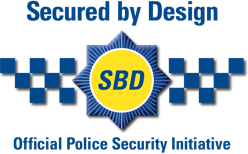Where possible, front doors should have a door chain and viewer.
New doors have strict limits on size of aperture as well as often having physical restrictors to prevent anyone reaching inside. These are usually called letterbox shrouds or restrictors. These are widely available for purchase and easily fitted.
Wooden back doors should ideally have a five-lever mortice deadlock and two bolts.
UPVC doors or doors with Euro Cylinders should have DHF TS007 3-Star, or Sold Secure Diamond Standard Anti-Bump replacement cylinders fitted. Always consult a Master Locksmiths Association accredited locksmith if you are uncertain. Badly-fitted Euro Cylinders can compromise your security.
When fitting security products always use strong bolts and long screws. Follow the manufacturer's guidelines or consult a specialist using the guide from the Master Locksmiths Association.
Laminated safety glass should be used in all glazed areas.
Wooden beading should be glued and fixed securely.
In the case of UPVC, beading should be internal. Older UPVC windows (externally beaded) can have the beading sealed into place.



